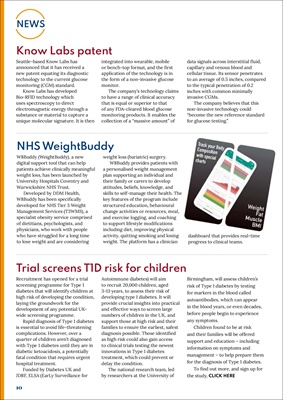
10
NEWS
Know Labs patent
Seattle-based Know Labs has
announced that it has received a
new patent equating its diagnostic
technology to the current glucose
monitoring (CGM) standard.
Know Labs has developed
Bio-RFID technology which
uses spectroscopy to direct
electromagnetic energy through a
substance or material to capture a
unique molecular signature. It is then
integrated into wearable, mobile
or bench-top format, and the first
application of the technology is in
the form of a non-invasive glucose
monitor.
The company's technology claims
to have a range of clinical accuracy
that is equal or superior to that
of any FDA-cleared blood glucose
monitoring products. It enables the
collection of a "massive amount" of
data signals across interstitial fluid,
capillary and venous blood and
cellular tissue. Its sensor penetrates
to an average of 0.5 inches, compared
to the typical penetration of 0.2
inches with common minimally
invasive CGMs.
The company believes that this
non-invasive technology could
"become the new reference standard
for glucose testing."
NHS WeightBuddy
W8Buddy (WeightBuddy), a new
digital support tool that can help
patients achieve clinically meaningful
weight loss, has been launched by
University Hospitals Coventry and
Warwickshire NHS Trust.
Developed by DDM Health,
W8Buddy has been specifically
developed for NHS Tier 3 Weight
Management Services (T3WMS), a
specialist obesity service comprised
of dietitians, psychologists, and
physicians, who work with people
who have struggled for a long time
to lose weight and are considering
weight loss (bariatric) surgery.
W8Buddy provides patients with
a personalised weight management
plan supporting an individual and
their family or carers to develop
attitudes, beliefs, knowledge, and
skills to self-manage their health. The
key features of the program include
structured education, behavioural
change activities or resources, meal,
and exercise logging, and coaching
to support lifestyle modifications
including diet, improving physical
activity, quitting smoking and losing
weight. The platform has a clinician
Trial screens T1D risk for children
Recruitment has opened for a trial
screening programme for Type 1
diabetes that will identify children at
high risk of developing the condition,
laying the groundwork for the
development of any potential UKwide screening
programme.
Rapid diagnosis of Type 1 diabetes
is essential to avoid life-threatening
complications. However, over a
quarter of children aren't diagnosed
with Type 1 diabetes until they are in
diabetic ketoacidosis, a potentially
fatal condition that requires urgent
hospital treatment.
Funded by Diabetes UK and
JDRF, ELSA (EarLy Surveillance for
Autoimmune diabetes) will aim
to recruit 20,000 children, aged
3-13 years, to assess their risk of
developing type 1 diabetes. It will
provide crucial insights into practical
and effective ways to screen large
numbers of children in the UK, and
support those at high risk and their
families to ensure the earliest, safest
diagnosis possible. Those identified
as high risk could also gain access
to clinical trials testing the newest
innovations in Type 1 diabetes
treatment, which could prevent or
delay the condition.
The national research team, led
by researchers at the University of
Birmingham, will assess children's
risk of Type 1 diabetes by testing
for markers in the blood called
autoantibodies, which can appear
in the blood years, or even decades,
before people begin to experience
any symptoms.
Children found to be at risk
and their families will be offered
support and education - including
information on symptoms and
management - to help prepare them
for the diagnosis of Type 1 diabetes.
To find out more, and sign up for
the study, CLICK HERE
dashboard that provides real-time
progress to clinical teams.